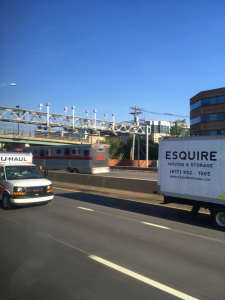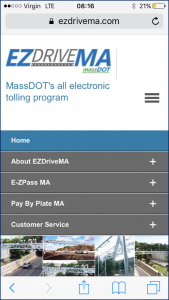
EZPass Home Page
The Online Search For an Answer About My Transponder
Logically, I went to my EZPass account to see what I could learn there. Like most people, I prefer the self-service through a website. Apparently Mass DOT doesn’t know their customers.
First stop was the detail about my toll transactions. The screenshot of the nearby Latest Transactions page shows transaction codes for each toll.
But what do those cryptic codes mean? V-TOLL ?? I don’t know – and they don’t tell me. DOT provides no documentation of their code structure. Thanks.
I can guess what they mean – I think – but I might be wrong. I believe that V-TOLL means “visual toll.” But why should I have to guess?
Hover text would be so useful here.
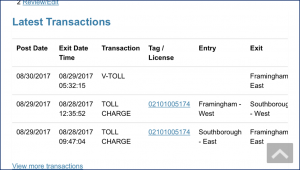
Mass EZPass Transaction Page
Next stop was the EZPass knowledgebase for answers, using logical terms like “How can I tell if my transponder isn’t working?” The returned results were completely useless. The knowledgebase Mass DOT makes available to its customers is truly elementary, containing marketing bromides and truly basic information, no problem-solving information. Sad.
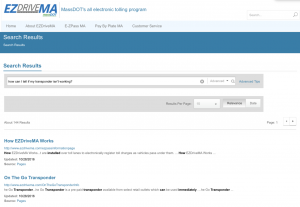
EZPass Search Results
Onto the customer service page. An email address is provided. I always prefer the asynchronous communication afforded by email versus listening to some onerous phone tree to then sit on hold. So, I sent an email.
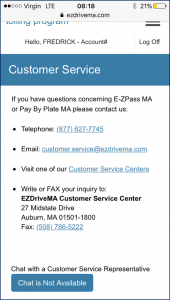
EZPass Customer Service Page
However, email proved useless. The service agent couldn’t tell me anything about my account transactions for security reasons. Why?
Because the email account is a general email account. My message was not sent through a system that recognized I had logged into my account. Mass DOT doesn’t have a basic contact management system to facilitate and track customer service interactions.
How 1995.
My only recourse was to call. Yes, after wasting my time trying to answer my own question, I was forced to use the most expensive contact channel for Mass DOT – and me! What a waste, meant in the Lean Six Sigma sense.
The answer: it appears the unit is not functioning and I have to either bring it into a service center and mail it. They can’t just ship me another one.
If You Can Automate Tolling, Why Can’t You Provide Proactive Warnings?
Here’s the truly silly thing.
Mass DOT has all the information needed to proactively tell motorists that their transponder isn’t working.
Transponders are linked to one’s EZ Pass account with specific registration plates. If they have to record a transaction using a photo of the license plate for accounts that have transponders – bingo! – the transponder isn’t working. Notify the motorist after this happens 2 or 3 times in a row!
Rocket science this is not. Logic it is. And good customer service it would be.
This problem is going to get worse and worse. My transponder dated back to 2001. Lots of transponders are nearing end of life. And no one will know until Mass DOT assesses them an administrative fee for not having a working transponder.
Any complaints to Mass DOT for such a charge will be fully justified.
The Lesson for Customer Experience Design
Consider ALL the implications of a change in process. While eliminating tollbooths is wonderful, no one apparently considered the value of the message boards, now lost. Is this news to Mass DOT? Well, aside from a generic contact form on the website, they appear to have no active feedback mechanisms in place.
And as a long-standing judge for the Association of Support Professional’s support website contest, I’d rate the Massachusetts EZ Pass website at best a “gentlemen’s D.”
Furthermore, I communicated these concerns to the Secretary of Transportation in a postal letter. I got zero response.
Supposedly, Governor Charlie Baker wants to instill a customer focus in state government. Clearly, there’s a lot of work to be done. I won’t hold my breath. If the people at the top of the org chart don’t understand customer focus, it will never happen on the front line.
~ ~ ~
Addendum. I have to include my exchange with the service agent for EZPass. I asked him if there were special instructions for shipping the unit. After telling me to wrap it in aluminum foil to prevent transmissions while in shipment, the agent said I should go to the post office and “ship it the free way.” (sic) I thought he meant by “highway,” meaning ground shipment, but this agent actually thought that the post office shipped stuff for free!
Why does this not surprise me?

